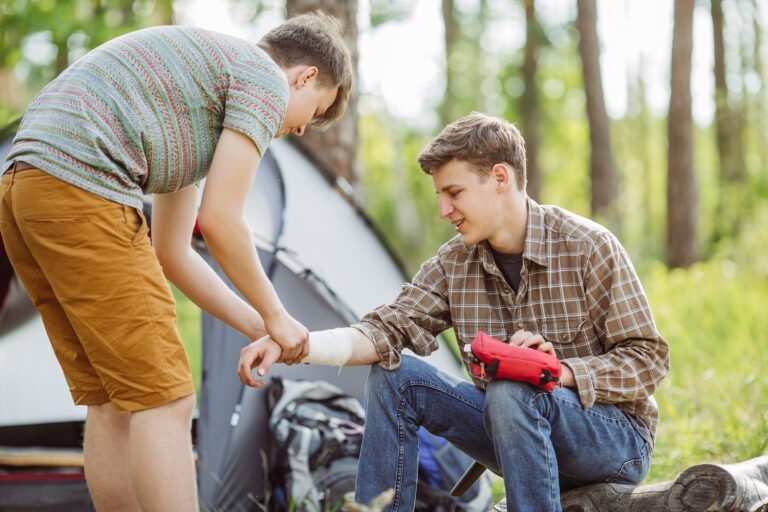If you’ve ever had the opportunity to go camping, you know it can be a fun and relaxing experience. You can enjoy nature, breathe fresh air, and spend time with friends or family without worrying about other distractions. But what happens if something goes wrong during your trip? This article will explore some of the most essential items to keep in your first aid kit for camping trips so that you’re prepared no matter what happens.
Gauze
Life is unpredictable, and you never know when you might need to bandage a wound. Gauze is the most essential item in your first aid kit. It’s used for cleaning wounds and preventing infection, as well as to stop bleeding and protect wounds from dirt. We recommend carrying a total of three rolls of gauze on your trip. You’ll also want to include some medical tape in your kit to secure any bandages or dressings you use around a cut or wound.
Band-Aids
Camping trips can get messy. Whether swimming in a lake or river, hiking through thick brush, or cooking over an open flame, there are plenty of opportunities for something to go wrong.
Band-aids can help prevent minor cuts and scrapes from becoming infected by dirt and bacteria. It’s also essential to have some waterproof bandages on hand in case any wounds caused by insects need treating quickly before they can get worse.
If you have an open wound, use a clean cloth or paper towel to soak up any excess blood before applying the bandage. This prevents the bandage from sticking to your wound as you put it on. Then apply the adhesive side of the bandage over your cut so that it sticks securely in place. If needed, wrap additional gauze around the edges of your injury for added protection against dirt and germs when hiking through nature or camping outdoors!
Neosporin
Neosporin is an antibiotic ointment that helps prevent infections. It’s a good choice for cuts and scrapes, particularly those exposed to dirt or water. The antibiotic properties of Neosporin help prevent the wound from turning into an infection, which can happen if you don’t clean your wound correctly after it’s happened. You can find Neosporin at most drug stores over the counter, but be sure to check with your doctor before applying it if you have any concerns about allergies or other medical conditions that may make using this product unsafe.
Alcohol Swabs
Alcohol swabs are used to clean wounds like cuts and scrapes. Alcohol works by dissolving the protective skin oils that keep out damaging substances. This causes the skin to dry out and makes blood clots easier.
- Alcohol swabs are an essential part of your first aid kit. They help prevent infection by cleaning wounds before you bandage them up or cover them with antibiotic ointment or antibiotic cream.
- Cleaning a wound with an alcohol swab has two benefits: it helps prevent scar tissue from forming, which can make lumps in the skin, and it kills harmful germs around the injured area.
- It’s vital that you use alcohol swabs correctly so they don’t hurt your skin more than they help! If you’re not sure what size swab is best for how large your wound is, consult your doctor about which ones would be best for your specific injury.
Hydrogen Peroxide
Hydrogen Peroxide is a liquid used to clean and disinfect wounds. It can be found in most pharmacies, and it’s often used as a mouthwash or medicine. Using hydrogen peroxide on a wound causes a chemical reaction that releases oxygen bubbles into the area of your skin where you applied it. These bubbles help kill harmful germs around the injured area while reducing scar tissue formation.
If you are camping in the wilderness and don’t have access to hydrogen peroxide, you can use plain old water as a substitute. Apply the water to your wound using a clean bandage or cloth and let it sit for 5-10 minutes before rinsing it with clean water.
Antibiotics
Antibiotics are a type of medicine that fights bacteria. Antibiotics aren’t effective against viruses but can help treat bacterial infections.
Bacterial infections often come in two varieties: acute and chronic. Acute infections occur suddenly, while chronic ones are slow to develop—but both can be treated with antibiotics if caught early enough.
If you’re short on time and worried about how to get antibiotics fast, you can quickly source them from online pharmacies. Though, we still recommend consulting with your doctor before taking any medication.
Like most medications, antibiotics have an expiration date (usually printed on the label). If you’re taking antibiotics for an infection that requires several days of treatment, make sure you don’t take them past the expiration date!
Conclusion
With some preparation, a first aid kit can help you take care of minor injuries and keep yourself safe while camping. But what do you have in yours?

